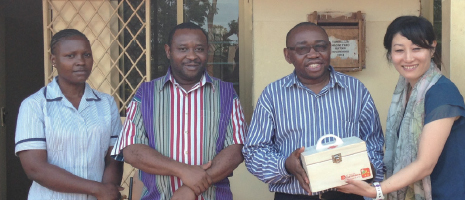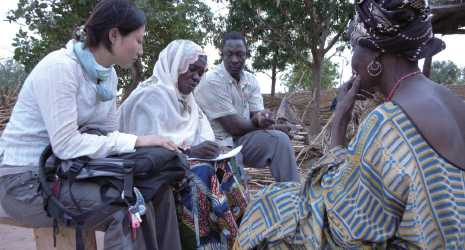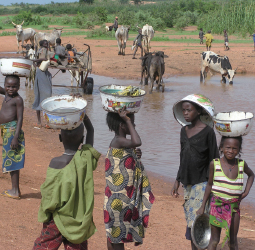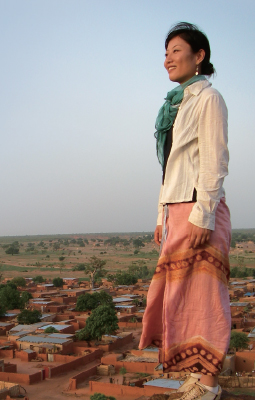Home > Highlighting JAPAN >Highlighting Japan April 2016>Women in the Lead
Highlighting JAPAN


Chests Full of Life and Hope
Pharmacist Eri Machii is on a mission to bring the traditional Japanese system of okigusuri medicine boxes to Tanzania. As president of the NPO AfriMedico, she wants to create a bridge between Japan and Africa through medicine, and promote health and happiness.
In most Japanese households, getting sick usually means a trip to a nearby hospital or clinic, or buying medicine at a local drugstore. For the majority of people living in Africa, however, the healthcare system is inadequate and common medications are hard to obtain.
Eri Machii, a pharmaceutical sciences graduate, is determined to provide easier access to common medicines in Tanzania through her NPO AfriMedico. While researching the history of okigusuri—use-first, pay-later boxes full of medicine—developed in Toyama Prefecture during the Edo Period (1603–1868), Machii found that the lifestyles of seventeenth- and eighteenth-century villages in Toyama were similar to those in parts of Africa today. Village families in Toyama at the time were typically quite large, healthcare infrastructure had yet to be established, and medical expenses were high due to the lack of an insurance system. By using the old Toyama model of putting essential medicines into an accessible box, which people can use first and pay for later, Machii hopes to improve the health of people in Africa.
Before focusing on Tanzania, Machii had observed the situation in Africa while working in infectious disease control in 2006 as a Japan Overseas Cooperation Volunteer in Niger. Many people were dying because hospitals were located so far away, not to mention the shortages of medicine. For two years, Machii helped educate the people about medicine and methods for combatting malaria and HIV/AIDs.
“Because the literacy rate is only around 20 percent, it was important to find ways to share knowledge with the people. We informed them using illustrated stories and radio broadcasts because they were the best tools to communicate through the eyes and ears,” recalls Machii. “In part as a result of our efforts, 89 percent of the villagers understood the causes of malaria at the end of two years, but they still were not taking preventive measures such as purchasing mosquito nets. Looking at the results, I understood that it was difficult to change people’s behavior by providing knowledge alone, and thought that bringing about change would require something beyond knowledge. I realized that ‘something’ was the introduction of an ongoing system—and that first I needed to improve my own abilities.”
Returning to Japan at the end of 2008, Machii took up work at a pharmaceutical company, and in 2011 she entered the Globis Graduate School of Management. There she met others with similar goals of innovating in medical care, and together they founded the private organization AfriMedico in 2013. Machii chose to focus on Tanzania first, taking into consideration the nation’s social stability, the scale of its GDP and the maturity of its logistics systems.
The AfriMedico team currently has roughly twenty volunteers in Japan and about ten volunteer staff in Tanzania. The team is researching the medical environment in Africa to determine the medical needs and ways of transporting medicine to isolated villages. Machii has been able to provide about fifty okigusuri sets to villages in Tanzania to date.
“We are trying to choose the most essential medicine to put into the okigusuri boxes,” Machii states. “There is only a limited amount of space, so we’re carefully examining the contents to match the situation on the ground. For example, since taking excessive malaria medication can contribute to the development of drug-resistant malaria parasites, we didn’t initially include countermeasures for the disease. However, since malaria is a significant problem in the area, we now include malaria testing kits, and recommend that people visit a hospital if they test positive.”
Machii’s next goals include further developing connections to businesses in Japan. “I think the model of okigusuri boxes, while born in Japan, represents a system that can make a positive contribution to the world,” she says. “I want to forge connections with other businesses and organizations, and leverage our individual strengths so we can place as many okigusuri boxes as possible in homes in Africa that medicine has yet to reach.”
© 2009 Cabinet Office, Government of Japan








